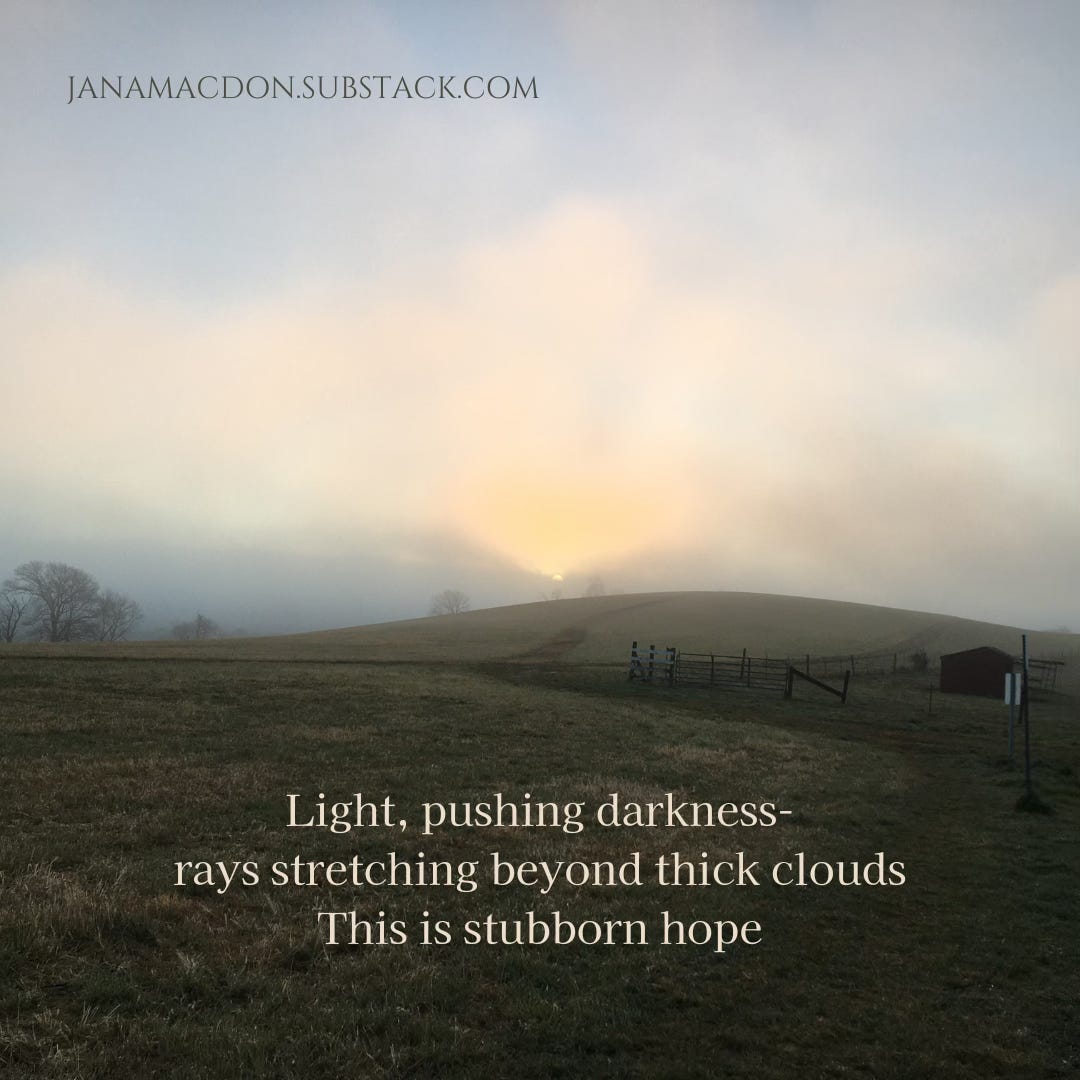Hi friends,
We are working through the Advent series I created: Light in the Darkness: Twenty-two simple practices for cultivating hope, peace, joy, & love. Last week we practiced hope, which included chasing sunsets, writing haiku poems, and visiting farmers markets. (This inspired one delicious and super easy meal: One Pot Creamy Mushroom Pasta 🍄.)
There’s been lots of good discussion over on the Facebook page and in the Substack chat, so be sure to check those out. I’ll continue to post my process there daily, and I encourage you to chime in with your thoughts and pictures, too! 📷
Today is Day 8. This begins the second week of Advent where we focus on peace.
Peace I leave with you; my peace I give to you. I do not give to you as the world gives.
Do not let your hearts be troubled, and do not let them be afraid. John 14:27
What is the kind of peace that Jesus gives?
Jesus’ description of peace feels like a tangible gift he hands us. Something He physically possesses that He now gives to us, like a precious family heirloom. In a world that uses violence, power, and control to build “peace,” Jesus promotes a new way - a radically different way.
Peace is not just the absence of war, or threat of physical violence. And peace is not the absence of tension. It’s the ability to hold that tension and work across lines of difference to promote reconciliation, taking what’s broken and restoring it to wholeness. Peace is a state of mind, and an attitude that promotes love of neighbor. Peace does not maintain the status quo, particularly when the status quo threatens the well-being of others. Peace is dignity, freedom, and security for all. Peace demands human flourishing for everyone. Only then will we experience true peace. This is the peace Jesus teaches. This is shalom.


Jesus is the Prince of Peace, and He calls us to be peacemakers, too. Today’s reflection invites us to consider the difference between peacekeepers and peacemakers. It also asks the question, “How would you describe yourself?” Here are a few of my thoughts, and I’d love for you to share some of yours.
Peacekeepers tend to avoid conflict. This is often a source of frustration for me, as peacekeeping never gets to the root of the problem. In an effort to ride out the conflict, tension builds instead, and there can never be true resolution. There are times when peacekeeping is wise (think holiday meals, when keeping the peace is a virtue), but in general I strive to be more of a peacemaker.
Peacemaking is active. It’s listening to understand. It’s seeking to engage diplomatically across lines of difference. It’s advocating for others. It’s elevating the voices of the marginalized. It’s engaging in the work that makes the world more equitable for all. And in order to do this work, we need to cultivate a spirit of peace from within.
(None of this is easy, by the way, but I have hope that it is possible.)
This is my goal, and yet there are times when I haven’t done it well. Though I always intend to engage with integrity, I regret that I haven’t always been tactful. It’s a delicate dance, because peacemaking requires truth telling. Truth can be difficult to express in a loving way, and it's often difficult to hear. Many of the issues we face are nuanced and complex, and people won’t be open to listening if they haven’t felt heard or understood. I know that this will be particularly important as we head into another difficult election year.
Peacemaking is
🕊️speaking out against oppressive governments and authoritarian leaders.
🕊️helping to resettle immigrants or refugees in your area.
🕊️preparing a meal for the homeless.
🕊️volunteering to help protect voting rights.
🕊️beating guns into garden tools.
🕊️driving your elderly neighbor to an appointment.
🕊️breaking unhealthy generational patterns.
🕊️cultivating a calming presence within.
This week, we’re going to look at some simple practices for cultivating peace in this upside-down world. I hope you’ll join us! You can get the free download here.





